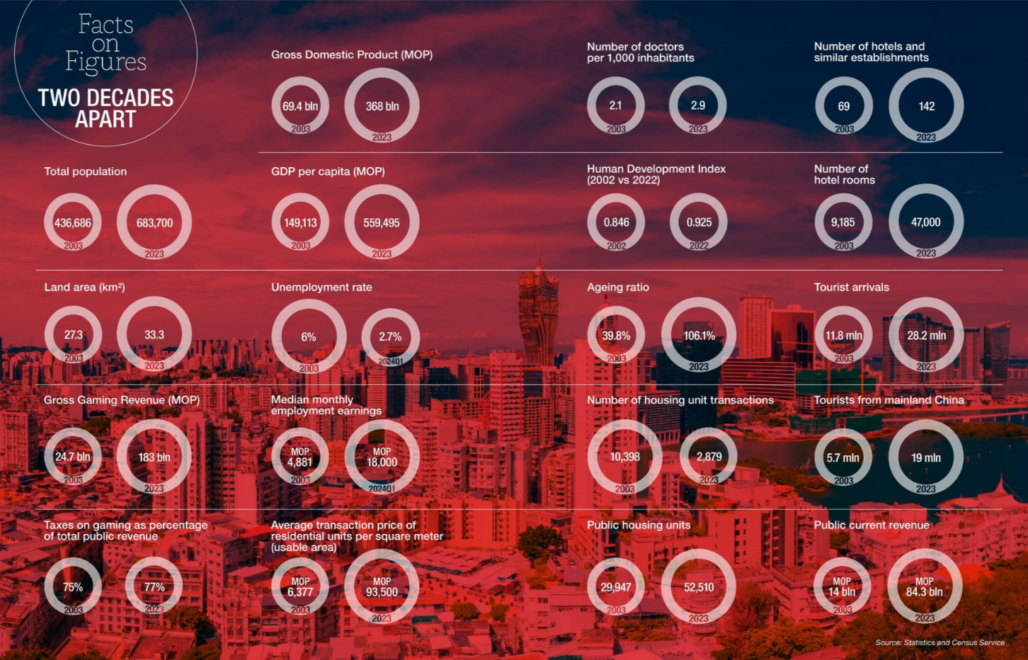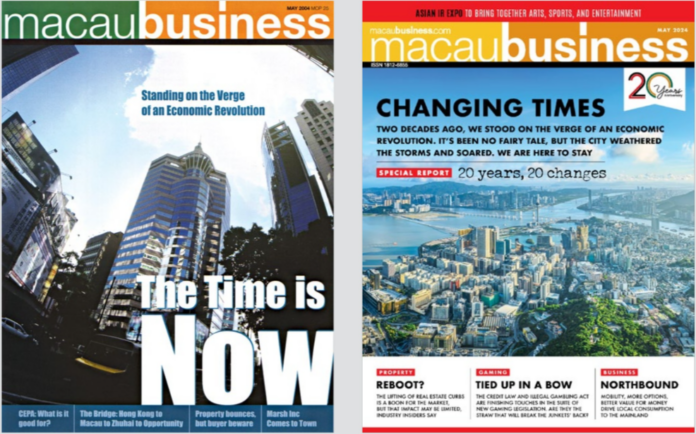Macau Business | May 2024 | Special Report | 20 years, 20 changes
Macau Business is watching
Macau today is a vastly different city than it was 20 years ago. Throughout this special report, we’ve identified a list of 20 changes, some of them, but many others had to be left out due to space constraints.
Why 20 years? Because Macau Business was born precisely two decades ago. But also because it was in May 2004 that the transformation, which we can all witness today, began with the opening of the first casino by one of the new gaming operators (Sands).
The city began to change, and here at Macau Business , we’ve been privileged witnesses to these transformations.
Macau will continue to change. The difference now is that few dare to predict where it will be in another 20 years.
All you have to do is read our magazine every single month.
Co-ordinated by João Paulo Meneses [email protected]
Much more education
To describe what has changed in education in Macau over these two decades, there is nothing better than referring to some numbers that do not require other considerations:
Environmental awareness
During the Portuguese administration, civil society in Macau was not particularly active, and some observers argue that not much has changed since the handover. However, there have been a few exceptions that stand out over the past two decades: the defence of historical heritage and the unique characteristics of the city (see the section on UNESCO in this special report), and the advocacy for a better environment.
Pathological gambling
One of the inevitable consequences of the expansion of the casino business has been the emergence of problem gambling among casino patrons, whether they are Macau residents or tourists.
GBA: expectations and results
Hengqin promises to change Macau, but the Guangdong Hong Kong Macau Greater Bay Area (GBA) project, involving nine cities in Guangdong province plus the two special regions, has the potential to become the world’s leading Bay Area. And if that happens, Macau will benefit the most.
Hengqin: Second Macau or extension?
There are 20 changes singled out in this special report, but if we had to choose just one, it would be the transformation of Macau into the world capital of gambling, measured in gross gaming revenues, surpassing Las Vegas and Atlantic City combined. Two decades from now, when Macau Business turns 40, the most profound transformation is likely to be called Hengqin.
Towards a hyper-ageing society
It was anticipated news, and confirmation arrived in March when the Statistics and Census Service released demographic data for 2023: the elderly population surpassed the young population for the first time, with the ageing rate significantly increasing to 106.1 percent. The elderly dependency rate was 24.8 percent (+1.7 percentage points annually), meaning that now, around 4 adults supported one elderly person.
Junkets, falling from grace
Twenty years ago, junkets (gaming promoters) were the primary drivers of casino revenue in Macau, with VIP gaming reigning supreme. A legacy of monopolistic times, none of the new concessionaires had the courage to reject the model that Stanley Ho had ‘invented’ a few decades earlier. Despite the high costs of commissions charged, the promoters represented a part of the business that the new operators did not dominate: the high rollers in the Chinese market, where not only gambling but also promoting this activity is prohibited.
Land Law, law of the land
A series of unprecedented events unfolded with the approval and subsequent implementation of the so-called Land Law (Law 10/2013): there were votes against, legislators leaving the room during the vote, a lawmaker appointed by the Chief Executive presenting a proposal to allow another interpretation of one of the most controversial Articles (the interpretive rule of Article 104(5)), and many deputies who initially voted in favor later regretted their decision, calling for a revision that never materialised.
Beating Las Vegas
For decades, Macau has been marketed to tourists as the Las Vegas of the East, a comparison even used in official promotions.
LRT: Promised mobility?
Since the end of the Public Opinion Program at the University of Hong Kong, we no longer have regular opinion polls on everyday life in Macau. It would be interesting to understand what local society thinks about its Light Rapid Transit (LRT) and, for example, how many have already travelled on the only operating line, the Taipa Line.
Casino market share shifts
Back in May 2004, Macau saw the opening of the city’s first foreign-owned casino as the liberation of the city’s gaming industry was coming into fruition. Sands Macao opened its doors with a bang in the Macau peninsula. It was just the beginning of a boom in both supply and demand with the Cotai strip and the new integrated resorts model taking centre stage. The monopoly held by SJM’s predecessor – STDM – gave way to a diversified landscape with six operators and a few ‘satellite’ casinos under third-party arrangements (majority operating under SJM’s license).
National security, comprehensive
In 2009, the Legislative Assembly approved the Law related to Defence of Security of State (also known as the Macau National Security Law), which prohibits and punishes acts of “treason, secession, and subversion” against the Central government, as well as “preparatory acts” leading to any of the three acts. The approval process was smooth, intended to comply with Article 23 of the Macau Basic Law, and since then, it has never been used.
Offshore: Heyday (and fall)
When Macau authorities realised that traditional industries with a significant impact on the local economy, such as textiles, toys, or fireworks, were relocating to China, they tried to attract companies from Hong Kong by promising a generous tax regime (the zero-tax rate).
Pandemic: Unprecedented challenge
In November 2022, many people in Macau were surprised to see thousands of spectators in football stadiums watching the World Cup in Qatar… without masks. At that time, very strict epidemic prevention measures were still in force here, aligned with the Zero-COVID policy. Relief only began on December 8.
Political reform (non) issue
While political reform seems to be a non-issue nowadays, it hasn’t always been the case over the past two decades.
The Lusophone platform
The liberalization of the gaming industry and the influx of foreign investment, notably from US giants, enhanced Macau’s image as the Las Vegas of the East.
Public housing focus
In Denmark, South Africa, Canada, or New Zealand, housing consistently ranks among the top concerns when you ask people about their priorities.
Mass tourism
At the beginning of 2005, the front pages of newspapers could be seen reporting on the spectacular increase in the number of tourists who had visited Macau the previous year: from 10.5 million in 2003 to 15.1 million.
Proudly UNESCO-listed
Macau, with the support of the Central Government, applied to have the historic centre of the city recognised as a World Heritage Site and received a positive response in July 2005.
Finally, the universal minimum wage regime
The universal minimum wage for all professions was only created in 2020. Despite the weight that workers’ associations have in Macau, there was never enough strength to pass a law that would establish a minimum wage for local workers, protecting them from overly low wages (domestic workers and those with disabilities were excluded).
What stays the same when everything (else) changes
Revisiting the opening text of this special report prompts us to ponder: amidst the whirlwind of change, what remains constant?

























